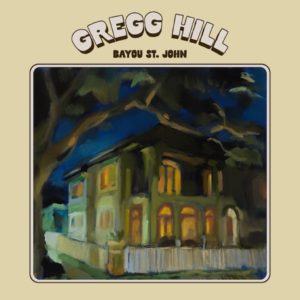Bayou St. John is Gregg Hill’s sixth overall record and second since relocating to the Crescent City in 2018. It’s also his first album recorded in New Orleans. His previous effort, 2022’s Born Liar, was cut in Nashville with producer Neal Cappellino with a luxurious 30 days of studio time. This time out, Hill enlisted New Orleans’ jazz-funk maestro Roland Guerin. Hill admires Guerin’s versatility to work in different genres, including singer-songwriter folk.

Bayou St. John was recorded over three days, mainly at Rabadash Studios in Covington, with a much smaller crew than Hill’s Nashville contingent. Hill played the same acoustic Martin guitar, Guerin played two acoustic basses, and Doug Belote was behind the traps. Supporting vocalists were Joy Clark, Lynn Drury, and Hill’s daughter Jesse. Guerin and Hill co-produced the proceedings.
The easily digestible eight-tune set is an enjoyable, intimate listen spotlighting one man singing his stories, accompanied by his masterful, intricate fingerpicking. As noted by “Places in Between,” they reflect what life is like now in the picturesque Bayou St. John neighborhood between Lake Ponchartrain and the Mississippi River. Yet, it’s not the physical location that’s the only attraction but the slowly revealed symbolism of how other facets of life are also between phases. “New Orleans Again” could be another “in-between” song: a protagonist often seeking temporary refuge in the city’s friendly confines but can’t permanently relocate due to other obligations.
The waltzing “One Minute Song” is literally a minute long, representing how fleeting life can be. Just listening to it, you may think the two-verse tune is longer because it segues subtly, even with a tempo change, into the intriguing instrumental “Magnolia Bridge.”
The Calypso-tinged “Oh-Dee-Aye,” where Hill plays a grand piano, is his cleverest tune with a complex rhyming scheme following an ‘A-B-C-D-C-B-A-D’ pattern. For a geeky example, the last word of the first A-line, “Dumaine,” rhythms with the last word of the next A-line, “Biscayne.” The final word of the first B-line, “river,” rhymes with the last word of the next B-line, “deliver,” and so on. Such an unorthodox pattern may not be immediately detected just by listening, but it does help keep the rhythm prancing along with a carefree island ambiance. Interestingly, the song’s characters come from real life and are referred to by their actual names.
The shuffling “Big Blue Moon” could be interpreted as a motion picture romance under the bright moonlight or just enjoying the family. Some tunes seem more straightforward. “Pooh Nanny” pays homage to his beloved dog; “Old Like Me” is a love affair between Hill and his cherished six-string, with both attempting to age gracefully. With these songs, it’s easy to envision Hill singing ’em in the still of the night on the porch of his St. John Bayou abode overlooking the calm, flowing water.




